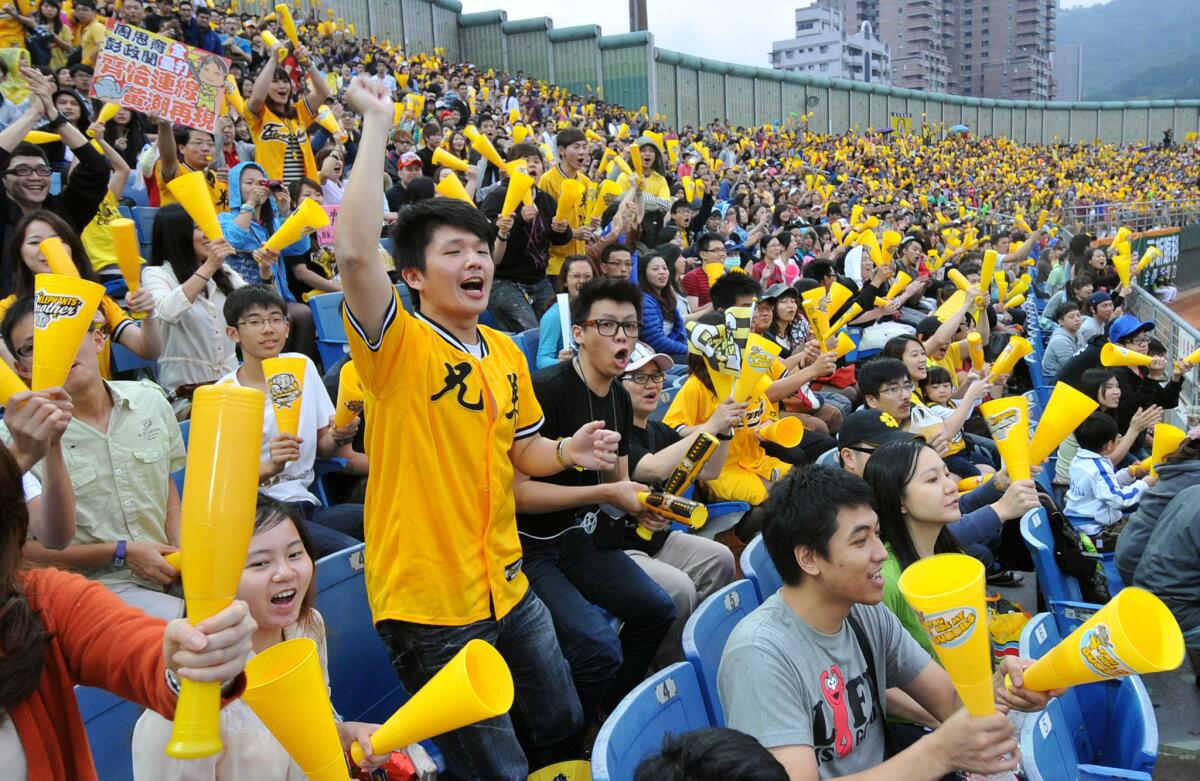Baseball was nearly dead in Taiwan after a major cheating scandal. Here’s how it made a comeback

- Share via
Reporting from TAIPEI, Taiwan — In Taiwanese professional baseball, the action on the field could rarely compete with the action off it — a long string of game-fixing scandals that threatened to destroy the league.
Players in cahoots with gambling rings would lose games on purpose, as the Chicago White Sox famously did in the World Series in 1919. One scandal implicated 26 active or former players on the same team, the Brother Elephants.
Fans grew tired of it and stopped attending games. Owners grew tired of it and started disbanding their teams.
Now the Chinese Professional Baseball League — a name that reflects the contentious history between Taiwan and mainland China — is making a comeback. Gambling scandals have all but disappeared. Stadiums are being renovated. Attendance is up, along with revenue from television and online broadcasts of games. There are plans to add new teams.
It’s a striking turnaround that baseball officials attribute to a national crackdown on game-fixing and an increase in player salaries aimed at reducing the incentive to lose on purpose.
“Over the past few years we’ve not heard about fake play,” said Justin Yang, general manager of the Brother Elephants, which posted 56 wins and 63 losses last season.
Baseball is as beloved in Taiwan as it is in the United States or Japan.
It has long been taught in high schools. Baseball diamonds are common along the riverbanks. Taiwanese heroes include former New York Yankees pitcher Wang Chien-ming and other players who made it in Major League Baseball.
“Everyone really likes baseball because from childhood we play it,” said Liao Hua-chieh, 40, a trainer for elementary school children who play on the weekends in Taipei, the Taiwanese capital.
But the professional league has been beset by scandal since its launch in 1989. Its low point came in 2008, as Taiwan’s Criminal Investigation Bureau investigated 102 illegal baseball betting cases involving 222 people.
The scandal involving 26 players on the Brother Elephants came the next year, when a gambling ring used a former pitcher on the team to bring active players and the head coach into a scheme to lose games. Two star players were permanently banned from the league.
By then, the number of teams had fallen from a high of seven to just four, which saw their combined attendance drop 45% between 2004 and 2008 as disillusioned fans turned to basketball or televised U.S. baseball.
The turning point came in 2009, when then-President Ma Ying-jeou intervened.
“We held a national level meeting with the president involved, so we came up with some new methods to control game-fixing, and those methods can really wipe out the problem,” recalled Wu Chih-yang, the league commissioner.
Among the changes was reclassifying game-fixing as fraud on par with rigging the national lottery, raising the punishment from as little as a year in prison to as a many as 10.
In 2014, the Brother Elephants raised total salaries for local hires by 13%, said Yang, the general manager. Foreign players, who generally earn more, had not been involved in the scandals.
“We’re the most aggressive of all the teams” in raising salaries, Yang said.
The league also withholds a third of each player’s salary until retirement and can confiscate it from anyone with a game-fixing conviction.
As gambling cases have become rare, the fans are returning.
Wu said that some older spectators may be unwilling to forgive but that a new generation is now following the sport.
“We’re going after young viewers, the new crew,” Wu said.
An average of 6,000 people attended the 240 regular season stadium games from March through September this year, triple the figure from 2012. More than 90% were under age 40.
Local television viewership of regular season games rose 27% over the last three years, according to AGB Nielsen. Over the same period, the number of people who watched on YouTube more than tripled to 58 million a year.
To lock in the new wave of interest, most of Taiwan’s stadiums are undergoing remodeling, adding pop music performances between innings and hiring cheerleaders, creating a festive atmosphere.
“It’s really noisy here, and maybe Americans wouldn’t be used it, but the Taiwanese like it a lot,” Wu said. “You need to feel some fun and pleasure, not just wins and losses, so now ticket sales are going higher and higher.”
Despite the success, only one team posted a profit last year, the Lamigo Monkeys. The teams stay in business thanks to corporate sponsors who like the exposure for their brands.
By 2019, the league plans to add two teams, bringing the total to six, which Wu said is the right number for Taiwan’s population of 23 million.
The past, though, is never far behind.
In July, China accused Taiwan’s under-18 baseball team of purposely losing to the Philippines, thus knocking China out of the final rounds of the Little League Baseball Asia-Pacific Regional Tournament. Officials considered the claim credible enough that they added a game between Taiwan and China, which Taiwan won 11-1.
Fans in Taiwan were happy and willing to overlook the cheating allegations this once.
Jennings is a special correspondent.
ALSO
A journey through ‘hell’: First wave of migrant children from Calais arrives in Britain
Thailand grieves for its late king — and wonders when its crown prince will take the throne
More to Read
Sign up for Essential California
The most important California stories and recommendations in your inbox every morning.
You may occasionally receive promotional content from the Los Angeles Times.













